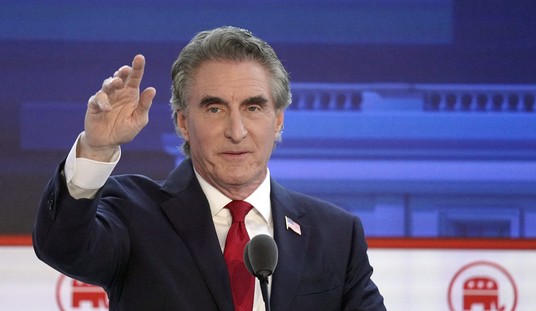
Early Saturday morning, the United States Senate passed a sweeping tax bill. While many conservatives are cheering its passage, they shouldn’t be. The bill is a massive and disastrous betrayal of conservative values, for four reasons.
First, the bill proves, once and for all, that no party in Washington D.C. cares about the national debt, its effect on our children, and its drag on the economy.
Second, the bill raises taxes on many in the professional middle class, to give away goodies to super-rich donors.
Third, the bill will drive up health insurance premiums by repealing ObamaCare’s individual mandate without repealing the other provisions of ObamaCare.
Fourth and finally, the bill fails to deliver on the stated goal of “simplifying” the tax code.
Yes, we’re going to dive into each one of those items and see how they fail to benefit Americans. Maybe, before the final legislation is agreed upon and sent to President Trump, some things can be fixed. Or amended. Or we can just start over. (Probably not that last one.)
Here we go…
1. THE BILL WILL ADD TO THE FEDERAL GOVERNMENT’S ALREADY CRUSHING DEBT
Unless you are Matt Yglesias, or some other equally smug and ignorant putz, you understand that the national debt is a huge problem. With the recent lifting of the debt ceiling, the debt exceeded $20 trillion dollars. I know that every number that ends in “illion” just ends up sounding like some variant of the word “big” to most people, so if you want a visual of what $20 trillion in hundred-dollar bills looks like, click here, or play this video:
For years, I have warned about the coming crash of the government debt bubble. You can’t go on borrowing like your drunk uncle Joe forever without the ultimate result being inflation and lots of it. And what’s the main thing that will jump-start the crash? Interest rates rising above their unnaturally depressed level. Bad news! That has already started to happen.
And as interest rates rise, and spending continues out of control, an ever-increasing chunk of the national budget will be devoted to interest payments. This will squeeze out other priorities and choke the private sector. Ultimately, our children are going to be paying for all this, one way or another — either in the form of higher taxes, or inflation. Given the cowardice of government officials, it’s going to be inflation. And it’s going to be bad.
And while our main problem is spending, and not taxes, this bill makes the problem worse.
Friday night, hours before the vote, the CBO estimated that the bill would add almost $1.5 trillion to the debt over ten years. Now look. I understand that CBO estimates are generally off. I also understand, and agree with, the argument that growth tends to offset part of the loss in revenue from a tax cut. Static scoring models tend to understate the extent to which growth resulting from a tax cut offsets the loss in revenue. This is all true.
But any honest economist will tell you that there is no guarantee that tax cuts “pay for themselves.” Kevin D. Williamson, who is (like me) a hardcore free marketeer with a respect for the economic philosophy of Ludwig von Mises and Friedrich Hayek, wrote a piece in September opposing the proposed Republican tax cut. It is worth quoting at length because it sets forth the case against the tax bill as an engine of growth that will allow tax cuts to “pay for themselves”:
Republicans want to cut taxes by $1.5 trillion — while the government already is running a deficit — and they propose to offset those cuts with wishful thinking.
. . . .
Tax cuts can contribute to economic growth by putting more money into the pockets of consumers and investors. In the free-lunch version of the story, that extra money produces so much new economic activity that the resulting growth in corporate and individual incomes offsets the reduction in tax rates. If that sounds like Keynesian stimulus theory standing on its head, it is. There is a multiplier effect — and politicians looking to sell you a bill of goods always assume that the multiplier is >1, even when there’s no reason to believe this to be the case.
Tax cuts can have anti-growth effects as well as pro-growth effects. Deficits and public debt are a drag on the economy, hoovering up investable capital and putting upward pressure on interest rates. If you want to eventually eliminate those deficits and pay down that debt, then you either have to raise taxes in the future, cut spending, or do both, i.e., you have to invert today’s stimulus measures at some point in the future. (“At some point in the future” is every politician’s favorite timeframe, of course — they all assume they’ll be dead or retired by the time the music stops.)
Williamson acknowledges that, for believers in the Laffer curve (and I am one, as most anyone with any knowledge of economics is), it is true that the loss of revenues can be offset to some degree by growth. But, he noted, it is irresponsible — and not very “conservative” — to expect that the net amount of revenue loss (including the offset) will not add to the debt and deficit:
Republicans are right about the existence of growth effects, but they are fooling themselves about the scale of those effects. There is nothing wrong in principle with “dynamic scoring,” the Republican-favored policy of incorporating growth effects into the Congressional Budget Office’s evaluation of the fiscal effects of legislation. But that should be done responsibly. The current pie-in-the-sky Republican attitude toward taxes is something else entirely. On the other hand, there’s a good conservative case for ignoring dynamic scoring, too: If we cut a dollar in spending for every dollar in tax cuts and find out 20 years from now that we could have gotten away with only cutting 70 cents in spending on the dollar, then that will be a happy surprise. Sobriety in expectations and caution about future developments was, once upon a time, considered “conservative.”
Bob Murphy, a free-market economist who worked for Arthur Laffer, explains that the notion that tax receipts would increase if taxes are cut “was never a blanket prediction of the Laffer approach.”
You can’t count on tax cuts to pay for themselves. These tax cuts are overwhelmingly likely to add to the deficit and debt. At a time when the national debt just passed $20 trillion, this is incredibly irresponsible. Moreover, those Senators who raised concerns about the debt were steamrolled, while others who usually worry about the debt said not a word. So the bill sends a signal that the real problem — out of control spending — will never be addressed. And that has potentially tragic consequences for our country.
2. THE BILL HIKES TAXES ON THE PROFESSIONAL MIDDLE CLASS TO GIVE TAX BREAKS TO SUPER-WEALTHY DONORS
The bill is also non-conservative because conservatives are supposed to stand for the middle class. And this bill raises taxes on many in the middle class, to pay for tax breaks for the very wealthy.
First, let’s clear some leftist tropes out of the way.
To be clear: I am not upset that the bill helps the wealthy. Any tax cut bill does. It’s ridiculous to oppose a tax cut on the basis that it benefits the wealthy more than it benefits the poor. Of course it does! The wealthy pay most of the taxes in this country.
The top 1% of taxpayers pay a higher effective income-tax rate than any other group (around 23%, according to a report released by the Tax Policy Center in 2014) — nearly seven times higher than those in the bottom 50%.
If you’re against a tax cut for the wealthy, you’re against tax cuts, period. Similarly, opposing a tax cut because “38% of Americans won’t get a sizable tax cut” ignores the fact that a good chunk of those people aren’t paying federal income tax to begin with.
That said, I don’t think it makes sense to increase taxes on any portion of the middle class while giving a tax break to the super-rich.
And make no mistake: taxes are going up on a lot of people in the middle class. Full disclosure: I am among the members of the professional middle class affected by these changes. How much they will affect me, I’m not sure. There was a flood of activity on the Senate floor just before the vote, with changes handwritten in the margins of legislation and copies cutting off the words in the margins. The last-minute changes included significant ones like the retention of the alternative minimum tax, which will hurt me. Depending on what the final bill looks like, my extra tax liability could be a few hundred extra per year if I’m lucky, and several thousand extra per year if I’m not.
But it’s not about me. Even if the final bill irons everything out to where I personally get a tax cut and not a tax hike, I would still oppose a plan that raised taxes on anyone in the middle class to give a tax raise to the super-rich.
And it does. Conservative Marc Thiessen says that “there are millions of Americans, including individuals and families at every income level, who would see their taxes hiked under the GOP plan.” (My emphasis.) Meanwhile, the bill does benefit the super-rich: “Congress’s official scorekeepers say over 80 percent of millionaires would pay less in taxes in the coming years under this plan.” This analysis was not done on the final version, but it’s obvious that there were no last-minute changes that will suddenly take away the tax breaks of most millionaires.
Again: I would have no problem if the super-rich were to receive a bigger break than the less well-off. They should get a bigger break, since they pay more. But to actually raise taxes on many in the middle class, while cutting taxes of the super-rich, is just plain wrong. People in the middle class are struggling with a lot of problems these days, including out-of-control college tuition and skyrocketing health insurance premiums. It’s infuriatingly bad policy to add to their burdens. As Thiessen says: “When Republicans reform the tax code, there should be no losers, especially not the middle class.” Amen to that!
Many justify this by arguing that the system is getting flatter. That argument has some appeal. I am generally in favor of a flatter tax system. As I said, I am a hardcore free marketeer — meaning I oppose government intervention in as many areas of life as possible. If we look at this only from the perspective of economics, I believe that any special tax break or deduction should be eliminated. But this can be done without raising the taxes of people in the middle class. All Republicans need to do is get rid of some breaks for the super-wealthy, and then lower middle-class rates enough to compensate for the aspects of the plan that hit the middle class in the gut. But GOP lawmakers are so intent on throwing bones to their donors, they simply don’t care that they are screwing the middle class to do it.
The GOP seems to be making a practical political calculation: most of the middle-class people hurt by this bill live in blue states that won’t vote for the GOP anyway. I understand the calculation, but there is a countervailing practical political issue here as well. Blue states aren’t entirely blue. While California will never throw its electoral votes to Donald Trump, we do send about 14 Republicans to the House of Representatives. We do donate to political candidates. But guess what? If Republicans in blue states have their taxes raised by hundreds or even thousands of dollars per family per year, those Republicans may not feel particularly inclined to keep donating to the politicians who voted to raise their taxes. They may even be so disenchanted with Republican lawmakers that they stay home on Election Day. If enough blue-state Republicans feel this way after they see what this bill does to them next April, the bloodbath in 2018 may be worse than any of us ever dreamed.
3. REPEALING THE INDIVIDUAL MANDATE WITHOUT REPEALING OBAMACARE WILL DRIVE UP PREMIUMS EVEN MORE
ObamaCare can never work. It’s an effort to centrally plan one-sixth of America’s economy. The effort was doomed from the beginning, because central planning never works. Ever. We should have learned this when millions starved to death under Communism. But like a cockroach that lives through a nuclear blast, socialism has an incredible ability to outlast the lessons of history, which ought to have destroyed the idea many times over, years ago.
ObamaCare tries to manipulate consumers by changing existing law in the hope that it will create an artificial demand for health insurance (through the individual mandate), to compensate for the requirement that health insurance be supplied at prices that would be unavailable in a truly free market (guaranteed issue). In other words, the law creates a price control, and then tries to avoid the shortages that price controls usually create, by creating an artificial demand by legislative fiat.
It isn’t working, and it never could work. Centrally controlled prices never do. Only the market can balance a demand for goods with a concominant supply of goods. From its inception, ObamaCare has resulted in insurance companies fleeing the exchanges and driving up premiums.
But you can’t fix an imperfect attempt by central planners to balance supply and demand by throwing only one end open to “deregulation.” California learned this in the 1990s with its failed semi-deregulation of utilities, which “deregulated” the supply chain, but left price controls in place on the delivery to consumers. It was a disaster, because you can’t do that. Markets work their magic only when both supply and demand are free of government regulation.
Yet one-sided “deregulation” is exactly what Congress is doing here. It is “deregulating” half of the market (by removing the mandate) while regulating the other half (by continuing to impose guaranteed issue and other regulatory requirements).
If insurance companies lose the part of ObamaCare that incentivizes young people to buy more insurance, by threatening them with a penalty (sorry, a “tax”) for failing to do so, then insurance companies will have to find some other way to deal with the increased costs of guaranteed issue and other regulations. Inevitably, they will do this through some combination of accelerating their current flight from the exchanges, and raising premiums even higher than we have seen to date.
So while ObamaCare’s scheme is unsustainable, the artificial demand created by the individual mandate does serve to balance, albeit imperfectly, the price controls created by guaranteed issue. Deregulating the individual mandate side while leaving the price controls in place will accelerate the death spiral caused by rapidly increasing premiums.
It’s terrible policy, and the egregiousness of it will take days for people to realize, amid the welter of discussion of other aspects of the bill. But make no mistake: this is one of the biggest problems of the Senate bill.
4. THE BILL DOESN’T REALLY SIMPLIFY DOING TAXES
Every tax bill is accompanied by its proponents’ claims it simplifies the filling out of a tax return. Every time, this is a lie. This time is no exception.
Nobody is going to be filing taxes on a postcard. Nobody! All the bill does is create a new set of winners and losers. Who those winners and losers are, exactly, will emerge only slowly over time, as we see what breaks lobbyists were able to lard the bill up with, in the mad rush to get this thing passed in the early hours of a Saturday.
Check out this Washington Post summary of the changes that we know about, and you’ll see a distinct lack of simplicity. There are still SALT deductions, just not as many. There is still an alternative minimum tax. It just applies to a different group. There is still an estate tax. It just applies to a different group of people. As the old shampoo commercial said: And so on. And so on. And so on.
IN CONCLUSION
Are there good parts about this bill? Sure, I guess. The corporate tax reduction is welcome. There will be more growth. A lot of Americans will see some actual relief from the bill. It’s not all bad.
But to me, the debt is a five-alarm fire. Any major legislation that makes it worse, and that signals we won’t fix spending, is a calamity.
So while you could say that the passage of the bill means both bad news and good news … yes, that is technically true.
But that’s like saying that the surgeon has bad news and good news after the operation. The bad news is that the surgeon cut off the wrong leg, and you still have gangrene in the leg he left attached. Whoops! I’m sorry about that. But on the bright side, he also put a band-aid on the boo-boo on your elbow and stopped a little bleeding.
Um, thanks for the small favor, I guess? But mainly, screw you guys for the horrible job you did.
Like a lot of things that have happened over the past year, the best real conservatives can say about this is that it has been … clarifying. It really puts a perspective on things, doesn’t it?













Join the conversation as a VIP Member